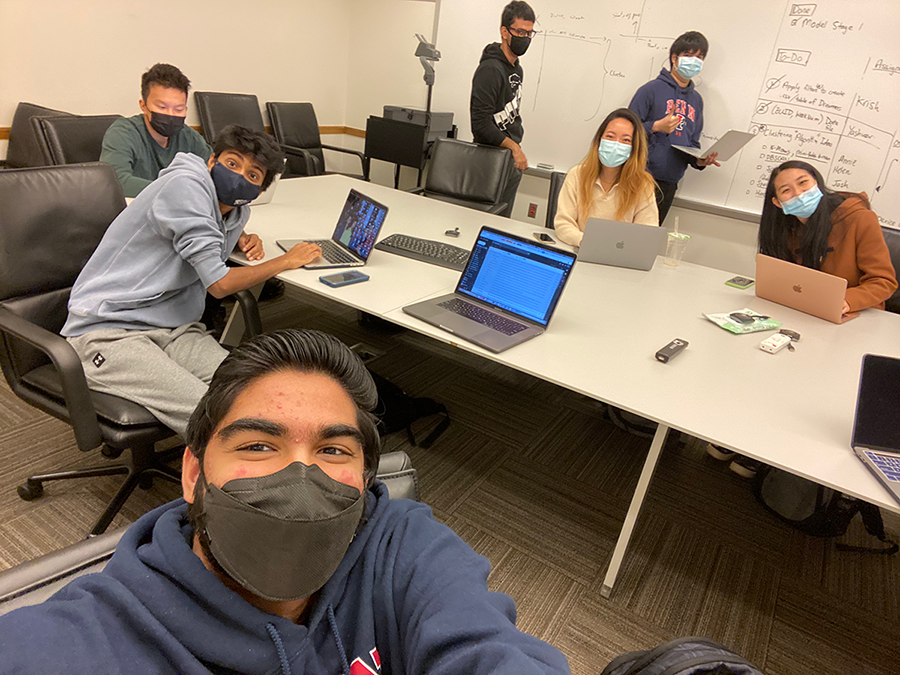Analytics at Wharton
Student Spotlight
Wharton Students Help Zillow Turn Data into Results

The Zillow project promised to be a tough one.
The online real estate company wanted to find meaningful patterns in the copious data it collects on site visitors, so the leaders turned to Wharton Customer Analytics for help. The project was put into the Analytics Accelerator, giving Zillow access to a team of Wharton and Penn students who worked for seven weeks to solve the problem.
Keshav Ramji, W’24 EAS’24, who is earning a dual degree in economics and computer science, was one of those students. A budding data scientist with a knack for numbers, the 18-year-old sophomore enjoys making order out of the chaos of data. And with Zillow, there was plenty of data.
“We were given data from 10,000 Zillow users, all anonymized,” said Ramji, who served as a senior analyst on the project. “At first, it seemed quite challenging because the data was disaggregated, so it was just not immediately helpful. The first thing we needed to do was figure out how to aggregate it to make it useful.”
The ultimate project goal was customer segmentation. Zillow wanted to know what makes some customers browse properties on the site without taking further action, while others click to learn more about a property, eventually contacting a listing agent. Understanding the data can help Zillow target different customers, especially the ones referred to as “dreamers” – site visitors who window shop without ever clicking through to buy or rent.
“We wanted to identify those dreamers, but we didn’t exactly know how those dreamers behave,” Ramji said. “So, there were quite a number of different features we had to examine and then aggregate appropriately.”
Forrest Dougan, marketing science principal at Zillow, said the company deliberately refrained from giving too much guidance to the Accelerator team because it didn’t want to bias the results.
“Our project that we picked was a little bit exploratory. We knew that there could be value in it, but it was a little bit of panning for gold,” he said.
At the end of the seven weeks, Dougan was more than impressed. Ramji and the rest of the team worked diligently to design models, revise those models, and find results with real-world applications.
Keshav Ramji

School
The Wharton School & School of Engineering and Applied Sciences, University of Pennsylvania
Majors
Bachelor of Science in Engineering: Computer Science, Bachelor of Science in Economics: Finance and Statistics
Minors
Mathematics and Data Science
Year
Sophomore
Hometown
New York City Suburbs
“The agility of analytical processes and the rigor the team put behind them was one of the more impressive shows of breadth in segmentation clustering that I’ve seen, and frankly, I was really surprised and impressed by the group.”
– Forrest Dougan, Marketing Science Principal at Zillow
“To be honest, we really waffled on whether we should even give this type of problem to a mixed group of graduate and undergraduate students,” Dougan said. “The agility of analytical processes and the rigor the team put behind them was one of the more impressive shows of breadth in segmentation clustering that I’ve seen, and frankly, I was really surprised and impressed by the group.”
The project was Ramji’s second with the Accelerator. During the spring semester, he worked with Fox Entertainment, analyzing social media data to help the firm with a marketing strategy for new content. He relished the work so much that he came back for more.
“It’s one thing for you to examine data, and it’s another thing for you to drive insights through it.”
– Keshav Ramji, W’24 EAS’24, Senior Analyst for the Zillow project
“I had a good experience, and I also wanted to get a better sense from other businesses about the split between exploratory analysis and modeling that they want to emphasize,” he said.
Ramji’s fascination with data science started in middle school with sports statistics. Having grown up in the New York City suburbs, he loves tennis and is a big Knicks basketball fan. As he gained more experience in high school, he realized the potential that data has to shape business and policy decisions.
“It’s one thing for you to examine data, and it’s another thing for you to drive insights through it.”
Seeing Data with ‘Fresh Eyes’
Zillow was one of three companies chosen for the Fall 2021 Analytics Accelerator program. The others were German discount supermarket chain Lidl, which wanted to identify how it fares against the competition in certain item categories, and Chinese instant noodle company Master Kong, which wanted to improve online sales predictions to determine inventory and reduce waste.
Dougan said Zillow leaders wanted to partner with Wharton because they wanted “fresh eyes” on their data.
“What we’re really excited about with this project and the result of the analysis is that it did show us that there is gold in the river,” he said. “We can now invest a little bit more internally in pursuing this.”
Practical application was a big part of the Zillow project and something that Victoria Lewis-Bogatyrenko, WG’94, kept pushing the team toward. She’s a WCA senior fellow who mentored Ramji and the other students on the project. A senior vice president at UnitedHealth Networks at United Healthcare, Lewis-Bogatyrenko knows that data alone adds little value to a business.
“Where we had a lot of fun was with the ‘so what.’ You have to pull yourself out of the data and put yourself in the shoes of a business person. It was really exciting to see them pivot in that direction,” she said.
Lewis-Bogatyrenko praised the students for their persistence and dedication, describing how they kept coming at the data in different ways to get to the answers Zillow needed.
“That entire team, when I say they did a fantastic job, they blew me away with both the analytics and the modeling they did,” she said. “They were presented with a data set that was incredibly challenging.”
Lewis-Bogatyrenko earned her MBA from Wharton and is an active alumna. She was asked to be a mentor for the Analytics Accelerator and felt it was a good fit.
“I really liked the idea of connecting with current students. I find it very invigorating. They’re incredibly smart. What appealed to me is the ability to build those relationships and give back to the community that gave a lot to me when I was there.”
– Victoria Lewis-Bogatyrenko, WG’94, SVP of UnitedHealth Networks at UnitedHealthcare
“I really liked the idea of connecting with current students. I find it very invigorating. They’re incredibly smart,” she said. “What appealed to me is the ability to build those relationships and give back to the community that gave a lot to me when I was there.”
Keshav said he also hopes to give back to the next generation and offered advice for younger students who are curious about data science: Learn everything you can about the discipline, especially programming, because building a broad skill set will help you grow an interest into a passion. He emphasized Python as a useful programming language for students to master, especially with its prevalence in the industry.
He also emphasized the importance of collaboration in data science, which sometimes can be a lonely pursuit. One of the biggest challenges during the Zillow projects was figuring out how to delegate the work. Ramji said the team did a lot of brainstorming to share their ideas and diverse perspectives. When one person gets stuck on a problem, collaboration can help solve it.
“I was able to work with pretty much every single one of our team members, and that gave me the opportunity to understand how they’re coming along with the project and how they are visualizing some of the challenges we’re facing,” he said.
“When I started out in data science I thought, how can I add machine learning to solve this problem? Now it’s, how can machine learning be incorporated to effectively drive a business solution?”
– Keshav Ramji, W’24 EAS’24, Senior Analyst for the Zillow project
Ramji said he’s passionate about data science and wants to learn more about the theoretical foundations of machine learning and deep learning. He’s also not ruling out another turn with the Analytics Accelerator.
“When I started out in data science I thought, how can I add machine learning to solve this problem?” he said. “Now it’s, how can machine learning be incorporated to effectively drive a business solution?”
— Angie Basiouny
About the Analytics Accelerator
Every fall and spring semester, Wharton Customer Analytics hosts the Analytics Accelerator, an experiential learning program that pairs students with a company to solve a real-world business problem using the company’s actual datasets and the latest techniques including machine learning and AI.


